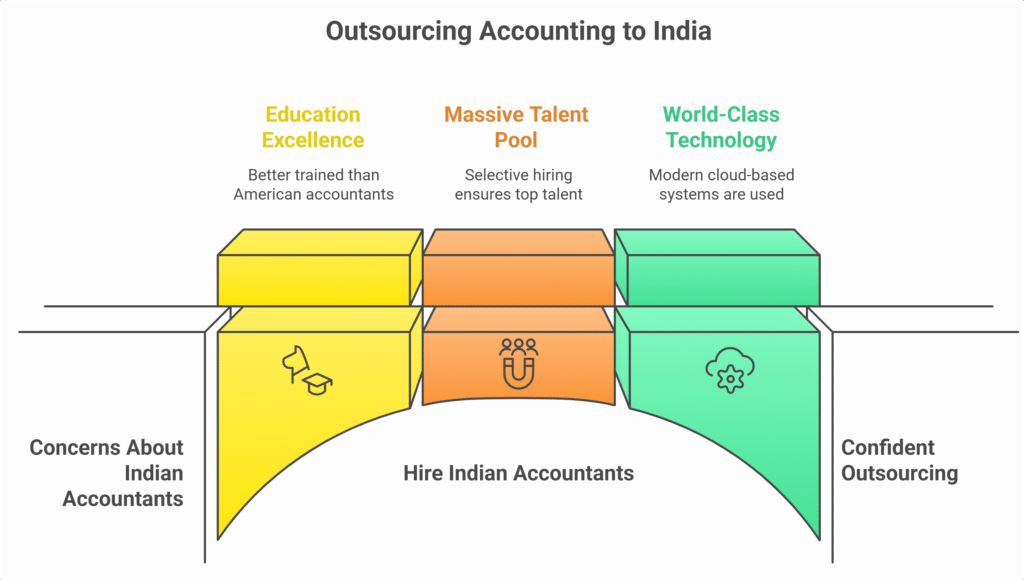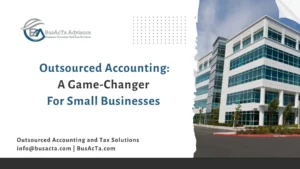Let’s talk about the actual money. Because while the quality and expertise matter, the financial impact is what gets most CPAs’ attention.
The reality: outsourcing to India creates significant cost savings. But it’s not just about cheaper labor. It’s about eliminating overhead costs that exist when you hire locally.
This guide shows you the real numbers not estimates or industry averages, but actual comparisons you can use to make decisions about your own firm.
Three Real-World Cost Scenarios
Scenario : Tax Accountant Handling 50 Returns Monthly
Twenty years ago, outsourcing to India was risky. Most CPAs didn’t trust it. You heard horror stories about work quality and communication problems. Firms that tried it often came back disappointed.
Today? It’s mainstream. KPMG has massive accounting centers in India. Deloitte employs thousands of Indian accountants who handle US tax returns. Even boutique CPA firms that pride themselves on personalized service now rely on India-based teams during tax season.
Why Bookkeeping Services Are More Important Than Ever: Let us be honest – a lot of people think bookkeeping is just data entry. Type in some numbers, balance the ledger, done. That’s not what it is at all.
Real bookkeeping is about clarity. It’s about control. It’s about knowing exactly what’s happening with your money and being confident in every decision you make based on that information.
What Changed? Three Things:
1. What Makes Indian Chartered Accountants Exceptionally Skilled?
The country has spent decades building one of the world’s most rigorous accounting education systems. The Chartered Accountant (CA) qualification in India is genuinely difficult the pass rate hovers around 5-10%. Compare that to the US CPA exam, which has about a 45-50% pass rate. Indian accountants going through that system don’t just know accounting they know it deeply.
2. Technology infrastructure matured
A decade ago, you couldn’t reliably work with someone in India because the internet connection wasn’t consistent enough. Now? Indian accounting professionals have the same high-speed connectivity and modern equipment you’d find in any US accounting office. They work with the same cloud tools, video conferencing software, and security systems that American firms use.
3. Actual experience built up
The early India outsourcing firms were learning as they went. By now, the established providers have handled hundreds of thousands of US tax returns. Their teams have seen every scenario, every complexity, every edge case. They don’t just know US tax law in theory they’ve lived it through thousands of real returns.

Why India Specifically?
1. Education Excellence
When you think about hiring someone from India to handle accounting, you might worry: “Are they properly trained?”
The answer is: often better trained than American entry-level accountants.
India’s CA qualification requires 4.5 years of formal education plus practical articles (apprenticeship) plus comprehensive exams. Many Indian professionals also hold CMA (Cost Management Accountant) certifications or have completed their B.Com (Bachelor of Commerce) degrees. What’s important: they’ve studied both Indian accounting standards AND US GAAP. They understand both worlds.
This matters because when you outsource tax returns to India, you’re not getting someone who barely passed their licensing exam. You’re getting professionals who’ve competed fiercely in one of the world’s most challenging accounting education systems.
2. Massive Talent Pool
Here’s something that matters more than it sounds: competition. With 2+ million qualified accountants in India and 400,000 graduating every year, accounting firms there can be incredibly selective about hiring.
This sounds like a problem (oversupply) but it’s actually fantastic for you. It means:
- When you work with a professional outsourcing firm, they’ve hired the best people they can find not just whoever was willing to take the job
- Specialized expertise is readily available (multi-entity returns, partnership accounting, international tax)
- Quality stays consistent because the talent pipeline never dries up
3. World-Class Technology Infrastructure
The popular myth: “India can’t handle modern cloud-based work.”
The reality: Indian tech professionals built many of the platforms everyone uses. Amazon, Microsoft, Google these companies have massive technical operations in India. Indian engineers contribute significantly to global technology.
For accounting professionals, this means they work with the same software you do (QuickBooks, Drake, Lacerte, cloud platforms). They use encrypted video conferencing. They manage secure data transfer. They understand cybersecurity protocols.
India isn’t “catching up” to American technology standards. In many ways, Indian firms have leapfrogged older infrastructure and jumped straight to modern cloud-based systems.

The Time Zone Advantage
India is 9.5 to 13.5 hours ahead of the US (depending on daylight saving time). Sounds complicated. Actually, it’s brilliant.
Here’s how it works in practice:
You hand off work at the end of your business day. Your India team works overnight on it. You wake up to completed work. For urgent situations a client needs a return finished for an evening meeting your offshore team can deliver 48-hour turnarounds that would be nearly impossible in a purely US-based operation.
It’s not just about speed either. It’s about flexibility. During tax season, when you’re drowning in work, you have an entire team working while you sleep. That extends your practical capacity without expanding your office or hiring permanent staff.
Conclusion
India’s rise to dominance in accounting outsourcing wasn’t accidental. It’s the result of decades of investment in education, technology infrastructure, and professional expertise.
The combination of rigorous accounting education, massive talent pool, world-class technology, favorable time zones, and proven track record has made India the obvious choice for US CPA firms looking to scale their operations efficiently.
FAQs
1. What exactly do bookkeeping services include?
Answer: Bookkeeping services handle the daily work of recording transactions and reconciling accounts. We keep your books organized and updated, and make sure everything stays in line with accounting standards. You always have a clear picture of your financial health and how your business is performing. Nothing gets missed.
Services Covered:
- Daily transaction recording
- Account reconciliation
- Financial organization
- Standards compliance
- Clear financial visibility
2. Why would a CPA office Offshore bookkeeping instead of handling it in-house?
Answer: Because it makes sense. Offshored bookkeeping saves your team time and reduces what you’re spending on staff. Your people stay precise and consistent. Most importantly, it frees your core team to focus on high-impact work—tax planning, financial strategy, client advisory. That’s where you make money. Data entry doesn’t make money. That’s the real reason.
Key Reasons to Offshore:
- Saves significant time for your team
- Reduces staff expenses
- Improves accuracy and consistency
- Frees team for high-value work
- Increases revenue potential
3. Is it actually safe to Offshore bookkeeping?
Answer: Absolutely. Work with a responsible bookkeeping firm and your information stays secure. We use encrypted file systems. We have strong confidentiality agreements in place. We operate under strict data protection processes. Client information is protected. It’s actually often more secure than keeping everything scattered across your office.
Security Measures Include:
- Encrypted file systems
- Strong confidentiality agreements
- Strict data protection processes
- Regular security updates
- Limited access controls
4. How does professional bookkeeping help small businesses specifically?
Answer:
Small businesses get real benefits. Less work for the owner to do. Lower expenses compared to hiring in-house staff. Instant access to people who actually know how to reconcile books and organize finances. For small business owners, it’s a game-changer. You’re not wearing every hat anymore. Someone else is handling the bookkeeping so you can run the business.
Benefits for Small Businesses:
- Reduced owner workload
- Lower than in-house staff costs
- Access to experienced professionals
- Better financial organization
- More time for business growth
- Professional-level accuracy





